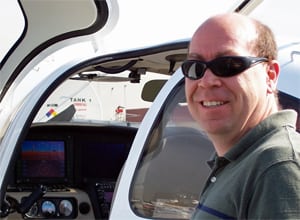Ron Dunn - Flight Instructor
Aspen Flying Club
| Flight Instructor: |
CFI, CFII, MEI, Mountain |
| Certificates Held: |
Airline Transport Pilot Multi Engine Land, Commercial Single Engine Land, Instrument Rated |
| Education: |
Bachelors of Science Degree in Aeronautical/Astronautical Engineering at University of Illinois |
Ron began his aviation journey with a discovery flight in Illinois and obtained his private pilot license while working towards his engineering degree. After completing the degree he moved to Southern California employed as a rocket engineer. He continued pursing aviation and acquired his CFI in 1997 followed by his CFII and ATP while gaining aerobatic and mountain flying experience and providing specialized transition training for Bonanza and Centurion aircraft. A job transfer in 2007 brought Ron to Denver where he acquired his multi-engine instructor certificate and continues to hone racquetball, golf, and mountain bike skills.
Ron looks forward to using his 1100+ hours of flight instruction experience to help you achieve your aviation goals in a fun and safe environment. Ron is generally available weekends and early morning/late afternoon weekdays or other times by appointment.
5 useful questions to ask an instructor:
Why did you become a flight instructor?
Regardless of the answer, the way an instructor talks about why they fly is what is important. Look for
someone that is excited by teaching. They should have a genuine interest in giving others the gift of flight.
How long have you been flight instructing?
Some Instructors have thousands of hours under their belts and have been flight instructing for their entire
careers. Others have a few hundred and are just beginning. A seasoned instructor will have a lot of experience
but may have a set teaching style. A freshly minted instructor has less aircraft time but is able to relate to
common learning obstacles, having undergone their own flight training in the not too distant past. There are
advantages to both types of instructor.
How do you keep track of your student’s progress?
Using a syllabus is essential so that both student and instructor can track progress and milestones so make
sure your instructor uses one. Talk to other students and ask them what kind of reading their doing, what
books they’re using and the type of homework they’re getting. There should ALWAYS have some type of “homework”
assignment at the end of each lesson.
What is your availability?
Some instructors are part-time and work separate jobs during the week. Others are full-time, but may want to
have personal and family time on the weekends. Find an instructor with compatible availability. Flying at least
twice a week is the best way to progress quickly through accomplishments with less effort and less overall costs.
Choosing an instructor that is able to fly on the same schedule helps to keep flight training on a consistent path.
I’ve heard people talk about “stalling an airplane.” Can you tell me what it means?
This is a classic question. Regardless of knowing what an “aircraft stall” is or not, how an instructor explains
this concept will give great insight into how they can explain concepts. Are they patient? Do they use simple
terminology that is easy to understand? Do they ask questions to make sure their student understands, or do they
over simplify to brush off the question? Find an instructor whose instructing style is a good match.

